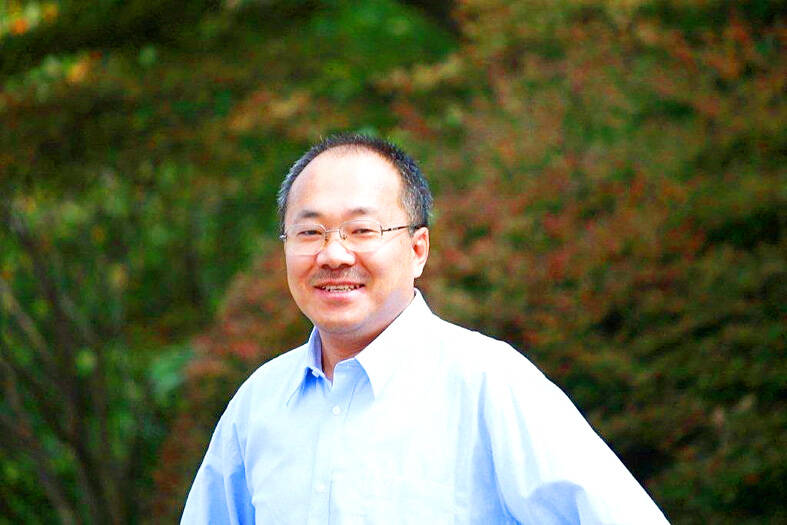A Beijing court yesterday sentenced veteran Chinese state media journalist Dong Yuyu (董鬱玉) to seven years in prison for espionage, his family said in a statement, calling the verdict a grave injustice.
Police in the Chinese capital detained the 62-year-old former Guangming Daily editor and journalist in February 2022 while he was lunching with a Japanese diplomat, the US National Press Club said in a statement. He was later charged with espionage.
“Sentencing Yuyu to seven years in prison on no evidence declares to the world the bankruptcy of the justice system in China,” Dong’s family said in a statement provided to Reuters. “Today’s verdict is a grave injustice not only to Yuyu and his family, but also to every freethinking Chinese journalist and every ordinary Chinese committed to friendly engagement with the world.”

Photo: Reuters
The family added that in the court judgement, Japanese diplomats whom Dong met were “specifically named as agents of an ‘espionage organization,’ which is the Japanese embassy in Beijing.”
Dong’s conviction implied every Chinese citizen would be “expected to know that the Chinese government may consider those embassies to be ‘espionage organizations,’” it said, causing a chilling effect.
Police guarded the court yesterday, with seven police cars parked nearby, and journalists were asked to leave the area. A US diplomat said they had been barred from attending the hearing.
Dong has been detained in a Beijing prison since a closed-court hearing in July last year, the press club said in September.
“Chinese authorities must reverse this unjust verdict, and protect the right of journalists to work freely and safely in China,” said Beh Lih Yi (馬麗怡), Asia program manager at the Committee to Protect Journalists. “Dong Yuyu should be reunited with his family immediately.”
Dong regularly had in-person exchanges with diplomats from various embassies and journalists.
The Japanese diplomat he met, one of two he had regularly met in the past, was also detained for several hours, spurring a complaint from the Japanese Ministry of Foreign Affairs.
At the time, a Chinese Ministry of Foreign Affairs spokesperson said the diplomat was engaged in activities “inconsistent with their capacity” in China. The diplomat was later released.
A Nieman Fellow at Harvard University in 2007, Dong was a visiting professor at Keio University and Hokkaido University in Japan.
He joined the Guangming Daily affiliated to the Chinese Communist Party, in 1987, after graduating from Peking University law school, and was the deputy editor of its commentary section.
He wrote opinion articles in Chinese media and liberal academic journals on topics from legal reforms to social issues, and coedited a book promoting the rule of law in China.
His articles advocated moderate reforms while avoiding direct criticism of Chinese President Xi Jinping (習近平).

POLITICAL PRISONERS VS DEPORTEES: Venezuela’s prosecutor’s office slammed the call by El Salvador’s leader, accusing him of crimes against humanity Salvadoran President Nayib Bukele on Sunday proposed carrying out a prisoner swap with Venezuela, suggesting he would exchange Venezuelan deportees from the US his government has kept imprisoned for what he called “political prisoners” in Venezuela. In a post on X, directed at Venezuelan President Nicolas Maduro, Bukele listed off a number of family members of high-level opposition figures in Venezuela, journalists and activists detained during the South American government’s electoral crackdown last year. “The only reason they are imprisoned is for having opposed you and your electoral fraud,” he wrote to Maduro. “However, I want to propose a humanitarian agreement that

ECONOMIC WORRIES: The ruling PAP faces voters amid concerns that the city-state faces the possibility of a recession and job losses amid Washington’s tariffs Singapore yesterday finalized contestants for its general election on Saturday next week, with the ruling People’s Action Party (PAP) fielding 32 new candidates in the biggest refresh of the party that has ruled the city-state since independence in 1965. The move follows a pledge by Singaporean Prime Minister Lawrence Wong (黃循財), who took office last year and assumed the PAP leadership, to “bring in new blood, new ideas and new energy” to steer the country of 6 million people. His latest shake-up beats that of predecessors Lee Hsien Loong (李顯龍) and Goh Chok Tong (吳作棟), who replaced 24 and 11 politicians respectively

Young women standing idly around a park in Tokyo’s west suggest that a giant statue of Godzilla is not the only attraction for a record number of foreign tourists. Their faces lit by the cold glow of their phones, the women lining Okubo Park are evidence that sex tourism has developed as a dark flipside to the bustling Kabukicho nightlife district. Increasing numbers of foreign men are flocking to the area after seeing videos on social media. One of the women said that the area near Kabukicho, where Godzilla rumbles and belches smoke atop a cinema, has become a “real

‘WATER WARFARE’: A Pakistani official called India’s suspension of a 65-year-old treaty on the sharing of waters from the Indus River ‘a cowardly, illegal move’ Pakistan yesterday canceled visas for Indian nationals, closed its airspace for all Indian-owned or operated airlines, and suspended all trade with India, including to and from any third country. The retaliatory measures follow India’s decision to suspend visas for Pakistani nationals in the aftermath of a deadly attack by shooters in Kashmir that killed 26 people, mostly tourists. The rare attack on civilians shocked and outraged India and prompted calls for action against their country’s archenemy, Pakistan. New Delhi did not publicly produce evidence connecting the attack to its neighbor, but said it had “cross-border” links to Pakistan. Pakistan denied any connection to